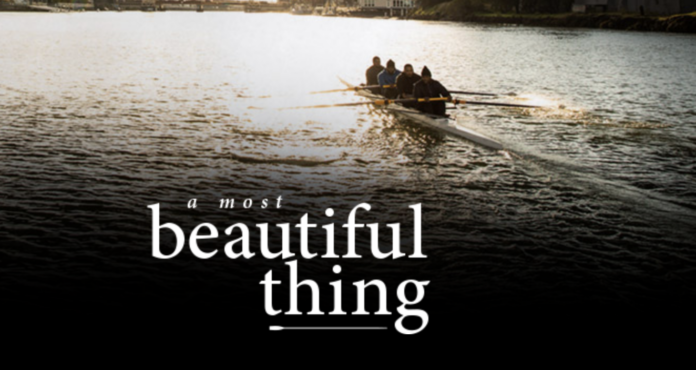BY ED MORAN
VIDEO PROVIDED
To continue reading…
Register for free to get limited access to the best reporting available.
Free accounts can read one story a month without paying.
Register for free
Or subscribe to get unlimited access to the best reporting available. Subscribe
To learn about group subscriptions, click here.
Already a subscriber? Login
Growing up on Chicago’s West Side, 14-year-old Arshay Cooper’s daily concerns included not wearing the wrong color shirt in the wrong neighborhood or having a baseball cap tilted the wrong way on his head. Those might seem trivial to most teenagers, but in Cooper’s life, they were details that, if missed, could have gotten him killed.
In his own words, written as part of his self-published 2015 memoir, Suga Water, that was just the way life was.
“At 15, I had already run for my life, had bullets fly straight past my head, skipped over pools of blood, and witnessed dead bodies on the street. On my block, there were 11 raggedy-ass buildings, five vacant blocks filled with empty 40-ounce beer bottles, and four liquor stores that lockdown each corner. It’s hard to believe in the American dream when you walk home through streets of abandoned buildings scattered with drug baggies. It was like God existed everywhere but here.”
“The rules of each street were set by different gangs,” he wrote. “If I wore certain colors in the wrong neighborhood, I could get shot. If I wore my baseball hat slightly to the left or to the right in the wrong neighborhood, I could get shot. If I scratched my head and it looked like my fingers were making a certain gesture in the wrong neighborhood, I could get shot.”
All that changed for Cooper the day that rowing was introduced at his high school, Manly Career Academy High School. During a three-day recruiting drive, the coaches who were inspired start the program brought an eight-oared shell into the school’s cafeteria. It took all three days to convince him, but Cooper joined the team. And it changed his life. Providing an opportunity for Cooper and other kids from the school—many of whom were members of rival gangs—to learn to row on the same team, and to experience the peace they all found on the water.
Today, Cooper’s story is being told again. His memoir is being reissued as a new book and will be released this year, along with a documentary feature that shares the new title of his book—A Most Beautiful Thing—that centers on Cooper’s story and a reunion of part of his old team. The film will be released March 27 at AMC Theatres in Los Angeles, New York, Chicago, Boston, Oakland, Philadelphia, Miami, and Washington, D.C.
The film is narrated and executive produced by Grammy, Oscar, and Emmy award-winning artist Common, and executive produced by NBA stars Grant Hill and Dwyane Wade along with Grammy-winning producer 9th Wonder. The film is directed by award-winning filmmaker and Olympic rower Mary Mazzio. It chronicles the beginnings of the country’s first African American high school rowing team, and the reunion that came 20 years later.
While the book and the documentary are about the rowing team’s beginnings and the way it changed the lives of Cooper and his teammates, it’s also about how, in the wake of the death of one of their coaches, Cooper and some of his teammates decided to reconvene two decades after their last race.
“I am hoping we reach more people of color, and get them involved in this amazing sport and the highest levels.”
-ARSHAY COOPER
They raced again as adults, not only to celebrate the team’s founding but also to commemorate the fact that they survived the West Side. Their reunion was made even more special after Cooper reached out to Chicago police officers to join their team.
In helping to bring their story to life in the documentary and the re-issue of his book, Cooper and the film’s producers are hoping the attention will inspire other inner-city athletes to find rowing and continue to diversify the American rowing community.
“I think, just for me, that is the number one goal,” said Cooper. “That’s the number one goal, and to use the tool of rowing to change lives and make rowing accessible to inner-city communities, like where I grew up. There is something spiritual about being on the water,” he added.
As part of his goal, his hope for the book and the film is that by the time the 2028 Olympics come to Los Angeles, an African American athlete will be among those competing. There have been African American athletes who have rowed for the U.S., including 1976 Olympian Anita DeFrantz and two-time Olympian (2008-2012) David Banks, both of whom participated in the film project. But Cooper is hoping that in eight years’ time he will be watching an African American athlete row for his or her country on American soil.
“There has never been an African American man who rowed in an Olympics on American soil,” Cooper said. “There are African American men now rowing at the college level and at the senior level. But I am hoping we reach more people of color, and get them involved in this amazing sport and the highest levels. I think this film will not only make it cool to row for inner-city kids but show that there are people that look like them that are rowing, that are excited about the sport.”

